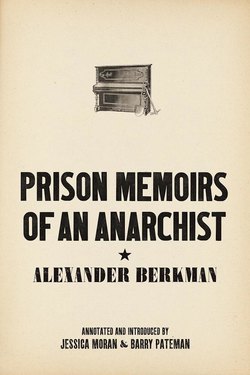Prison Memoirs of an Anarchist

Реклама. ООО «ЛитРес», ИНН: 7719571260.
Оглавление
Berkman Alexander. Prison Memoirs of an Anarchist
Prison Memoirs of an Anarchist
Dedication
Epigraph
Introduction
Chapter I: The Call of Homestead
Chapter II: The Seat of War
Chapter III: The Spirit of Pittsburgh
Chapter IV: The Attentat
Chapter V: The Third Degree
Chapter VI: The Jail43
Chapter VII: The Trial
Part II: The Penitentiary84
Chapter I: Desperate Thoughts
Chapter II: The Will to Live
Chapter III: Spectral Silence
Chapter IV: A Ray of Light
Chapter V: The Shop
Chapter VI: My First Letter
Chapter VII: Wingie
Chapter VIII: To the Girl
Chapter IX: Persecution
Chapter X: The Yegg
Chapter XI: The Route Sub Rosa
Chapter XII: “Zuchthausbluethen”140
Chapter XIII: The Judas
Chapter XIV: The Dip
Chapter XV: The Urge of Sex
Chapter XVI: The Warden’s Threat
Chapter XVII: The “Basket” Cell172
Chapter XVIII: The Solitary
Chapter XIX: Memory-Guests
Chapter XX: A Day in the Cell-House
Chapter XXI: The Deeds of the Good to the Evil
Chapter XXII: The Grist of the Prison-Mill
Chapter XXIII: The Scales of Justice
Chapter XXIV: Thoughts That Stole Out of Prison
Chapter XXV: How Shall the Depths Cry?
Chapter XXVI: Hiding the Evidence
Chapter XXVII: Love’s Dungeon Flower
Chapter XXVIII: For Safety
Chapter XXIX: Dreams of Freedom
Chapter XXX: Whitewashed Again
Chapter XXXI: “And By All Forgot, We Rot and Rot”258
Chapter XXXII: The Deviousness of Reform Law Applied
Chapter XXXIII: The Tunnel
Chapter XXXIV: The Death of Dick
Chapter XXXV: An Alliance with the Birds
Chapter XXXVI: The Underground
Chapter XXXVII: Anxious Days
Chapter XXXVIII: “How Men Their Brothers Maim”280
Chapter XXXIX: A New Plan of Escape
Chapter XL: Done to Death
Chapter XLI: The Shock at Buffalo
Chapter XLII: Marred Lives
Chapter XLIII: “Passing the Love of Woman”
Chapter XLIV: Love’s Daring
Chapter XLV: The Bloom of “The Barren Staff”
Chapter XLVI: A Child’s Heart-Hunger
Chapter XLVII: Chum
Chapter XLVIII: Last Days
The Workhouse
The Resurrection
Diary 1910–1911, 1916
Additional Images
Bibliography
Acknowledgments
Index
The Kate Sharpley Library
Copyright
Friends of AK
Отрывок из книги
Alexander Berkman
Annotated And Introduced By
.....
No, the revolutionist owes no duty to capitalist morality. He is the soldier of humanity. He has consecrated his life to the People in their great struggle. It is a bitter war. The revolutionist cannot shrink from the service it imposes upon him. Aye, even the duty of death. Cheerfully and joyfully he would die a thousand times to hasten the triumph of liberty. His life belongs to the People. He has no right to live or enjoy while others suffer.
How often we had discussed this, Fedya and I. He was somewhat inclined to sybaritism;61 not quite emancipated from the tendencies of his bourgeois youth. Once in New York—I shall never forget—at the time when our circle had just begun the publication of the first Jewish Anarchist paper in America, we came to blows.62 We, the most intimate friends; yes, actually came to blows. Nobody would have believed it. They used to call us the Twins. If I happened to appear anywhere alone, they would inquire, anxiously, “What is the matter? Is your chum sick?” It was so unusual; we were each other’s shadow. But one day I struck him. He had outraged my most sacred feelings: to spend twenty cents for a meal! It was not mere extravagance; it was positively a crime, incredible in a revolutionist. I could not forgive him for months. Even now,—two years have passed,—yet a certain feeling of resentment still remains with me. What right had a revolutionist to such self-indulgence? The movement needed aid; every cent was valuable. To spend twenty cents for a single meal! He was a traitor to the Cause. True, it was his first meal in two days, and we were economizing on rent by sleeping in the parks. He had worked hard, too, to earn the money. But he should have known that he had no right to his earnings while the movement stood in such need of funds. His defence was unspeakably aggravating: he had earned ten dollars that week—he had given seven into the paper’s treasury—he needed three dollars for his week’s expenses—his shoes were torn, too. I had no patience with such arguments. They merely proved his bourgeois predilections. Personal comforts could not be of any consideration to a true revolutionist. It was a question of the movement; its needs, the first issue. Every penny spent for ourselves was so much taken from the Cause.63 True, the revolutionist must live. But luxury is a crime; worse, a weakness. One could exist on five cents a day. Twenty cents for a single meal! Incredible. It was robbery.
.....